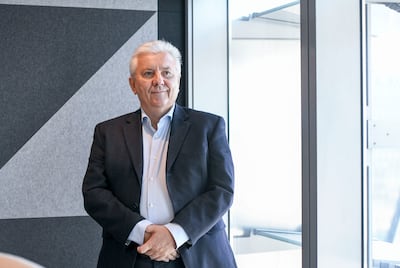The UAE is in an ideal position to make the most of data research and high-performance computing, which could transform medicine and health care around the world in the months and years ahead, according to Horst Simon, an internationally recognised expert in computer science.
“We shouldn't have to wait until someone has a heart attack,” said Mr Simon, who also serves as director of Adia Lab, Abu Dhabi’s independent institute dedicated to research in data and computer sciences.
“We should be able to predict with a lot of precision when it might happen, and take the proper preventive measures at the right time,” he said, reflecting on the type of research done by Adia Lab, a little more than one year after it was launched by Abu Dhabi Investment Authority.
“Abu Dhabi is in a perfect position right now, if you look at machine learning, it's recognised for that work done locally at Mohamed bin Zayed University of Artificial Intelligence (MBZUAI), and you also have the work that G42 is doing,” Mr Simon said, referring to the UAE-based national-scale enabler for cloud and generative AI.
The challenge, in 2024 and beyond will be transforming the unprecedented amount of medical data into something that can be used by healthcare professionals around the world, he said.

“Someone may have a great idea on how to analyse the medical data but to take the insight and turn it into a tool, even if we build the right software, and bringing it into the day-to-day medical practice is a big challenge,” he said.
“It's always a challenge going from research from deployment, and it always takes a long time.”
For the past year, Adia Lab has focused on looking at ways data and computational sciences could positively affect societally important topics such as health care, energy, climate telecoms and financial inclusion, Mr Simon said.
Adia Lab plans to expand activities in 2024 by offering more fellowships, sponsoring additional research projects, and launching new collaborations with universities and research institutes.
Throughout 2023, Adia Lab grew its advisory board to 10, with members such as former US Secretary of Energy Steven Chu to 2012's Turing Award winner and computer scientist Shafi Goldwasser.
It also established its European headquarters in Spain, launching five research programmes with Spanish universities and research institutions to increase scientific knowledge.
Mr Simon also reflected on other areas where Adia Lab hopes to make inroads in light of recent news developments.
Just weeks after the Cop28 climate conference in Dubai, where a milestone agreement was reached to begin cutting back on fossil fuels, Mr Simon said there's an opportunity to look at how climate change policies might affect and change the economy.
“There's an energy surplus that currently creates wealth,” he said. “Nobody is thinking about what will happen if we change the energy balance.”
He also addressed the countless articles, discussions and debates revolving around artificial intelligence, cautioning against doomsday predictions that have come from various technology circles about how transformational technology might negatively impact the world. He compared it to the fears that surround genetically modified organisms (GMOs) and nuclear energy.
“Those fears were oversold,” Mr Simon said. “Any new technology experiences this, and there's concern from humans afraid of change … but that doesn't mean we shouldn't do research work,” he cautioned. “AI is not going to kill us.”
“We're going to see a lot of beneficial applications of AI in the next year,” he said, adding that by 2025, AI won't be seen as unusual or new.


